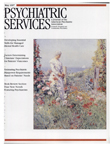Effects of diagnosis, demographic characteristics, and case management on rehospitalization
Abstract
OBJECTIVES: A randomized controlled study was conducted to assess the effects of case management and patients' characteristics on the use of inpatient psychiatric services. METHODS: Inpatients discharged from Harlem Hospital Center in 1984-1985 were randomly assigned to an outreach case management team or standard aftercare. Analysis of variance was used to assess the main effects and two- and three-way interaction effects of treatment status, gender, age, substance abuse, and diagnosis on the number of days of psychiatric rehospitalization in state and city community hospitals. RESULTS: In the follow-up period, 75 of the 146 patients in the case management group (51.4 percent) and 51 of the 143 patients in the control group (35.7 percent) were rehospitalized for psychiatric care. On average, patients spent 31.1 days in city hospitals and 26.6 days in state hospitals. Members of the case management team spent a mean total of 18.1 hours a month in direct and indirect care for each patient. They spent most time with substance- abusing older women. Significant three-way interaction effects were found between treatment status and diagnosis and gender, diagnosis and age, and diagnosis and substance abuse on the number of days patients spent rehospitalized for psychiatric care in city and state hospitals. CONCLUSIONS: It is unlikely that case management intervention will reduce rehospitalization rates unless appropriate and effective outpatient and community services are available. Effective surveillance of patient populations by case managers frequently results in rehospitalization as the only treatment alternative if other options for meeting the needs and resolving the crises of patients are not available.



